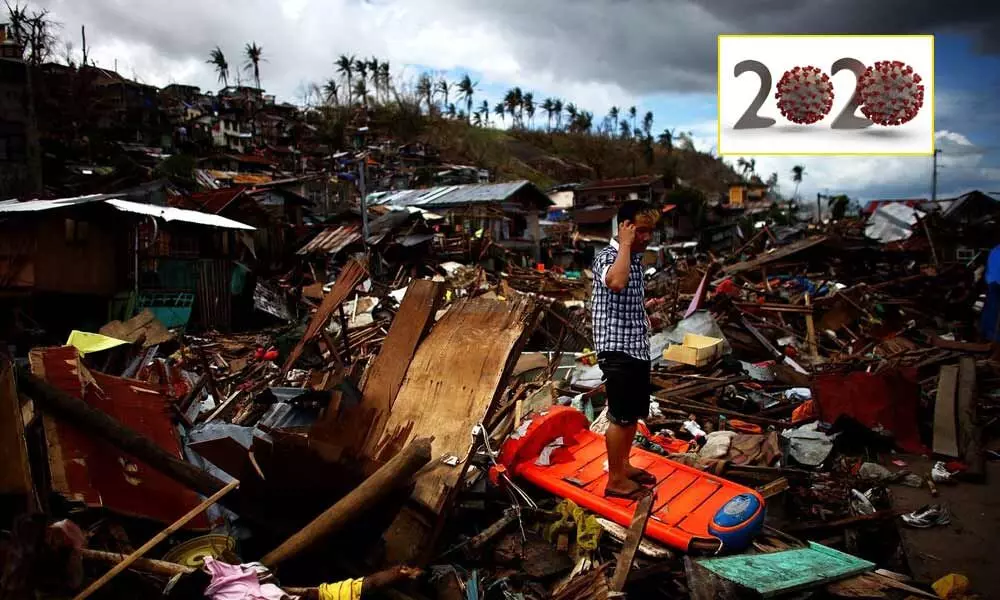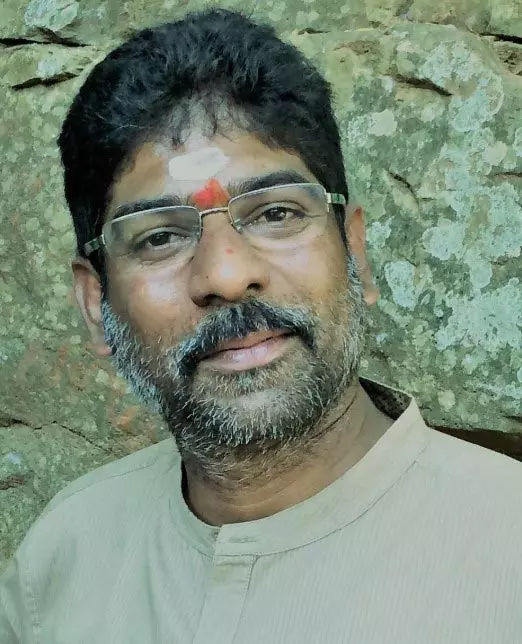Time to ring out the year of reckoning

Time to ring out the year of reckoning
No one wants to remember the year 2020 for reasons obvious
No one wants to remember the year 2020 for reasons obvious. Filled with fear, panic, deaths and massive destruction, the year is finally going to bid goodbye in a few hours from now, leaving scary images of tragedies hitherto unthinkable. The year has taught the world the futility of all our conceit and greed.
Though the world raised the roof and made merry, singing and dancing, and bursting firecrackers as usual while ringing in the new year, no one thought that they were ushering in a host of abysmal maladies, tragedies and melancholies.
It all began when a student of Wuhan university in China who landed in Kerala in the end of January tested positive for Covid-19 that soon spread across the globe at breakneck speed. Then followed deaths due to the new disease; and lockdowns and restrictions happened. Millions of migrant labourers were caught unawares and started heading for their villages on foot as they were rendered jobless and homeless. Hundreds of them fell dead while walking back home due to fatigue, mishaps and unforeseen accidents. Even the governments remained mute spectators to the spine-chilling episodes while a few good Samaritans and voluntary organisations sprang into action and extended help to the hapless workers. The dance of destruction continued until the yearend and authorities are still struggling to introduce a successful vaccine for the pandemic. By the time this report went to the press, the virus claimed a total of 1,48,190 lives and is continuing its fatal expedition unabated.
Even as the country has been struggling to find a way out of the misery, a super cyclone Amphan wreaked havoc across West Bengal and Odisha in May. As many as 72 people were killed in West Bengal, 1,48,486 people were evacuated, and 1,885 pregnant women were shifted to hospitals for better care in what the Chief Minister Mamata Banerjee termed was 'worse than coronavirus'.
Then came the locust attack which sent shock waves among farmers across Rajasthan, Gujarat, Punjab, Haryana, Uttar Pradesh, Madhya Pradesh and Maharashtra. Millions of desert locusts flew in from across the neighbouring Pakistan's border launching the worst pest attack in two decades during May and June. However, On July 4, a bell helicopter took its first sortie in Rajasthan's Jaisalmer district and completed the spraying of chemicals in targeted areas and chasing them out at least for the time being.
When the nation was mulling ways and means to mitigate the damages being caused by the pandemic and other natural disasters, came cyclone Nisarga on June 3 with a speed of 120 km per hour, wreaking yet another havoc.
In the first week of August, south Mumbai witnessed the heaviest single-day downpour in 46 years. Areas like Churchgate, Marine Drive, Fort, Girgaum, Khetwadi, Walkeshwar Road, J J Marg, Gol Deol, Bhendi Bazaar, Kalbadevi were totally submerged and it took several days for the authorities to bring back normalcy in the economic capital of India.
Meanwhile in Assam, a devastating flood claimed 113 lives and affected over 56.9 lakh, houses, crops and other assets. Even animals were not spared. In Kaziranga National Park alone, about 137 wild animals including 14 rhinos, 101 hog deer, 10 wild boars, five wild buffaloes, three porcupines and two swamp deer lost their lives due to the floods.
On August 7, an Air India flight carrying 190 passengers as part of Central government's Vande Bharat Mission crash-landed in Kozhikode's Karipur airport killing 18 including two of its pilots and injuring over 100. Just two days after that, on August 10, a massive landslide in Kerala's Idukki district buried 55 people alive at a stretch, let alone hundreds of animals and houses.
Closer home in Hyderabad, heavy downpour that lasted two days in October second week literally submerged the 'City of Nizams', claiming several lives and leaving thousands of residents stranded and rendered homeless and without food.
In every way it was a year of doom, despair and deaths. People have learnt to live with the new normal, but slowly yet steadily things are limping back to normalcy. Lessons were learnt, we have got into terms with confinement and seem to have mustered courage to face any challenge.
While this is the case with India, the whole world has been going through similar, or more severe conditions. The year witnessed record-breaking heat, wildfires and storms. The UN Secretary-General António Guterres urged every country to declare a "climate emergency."
This year was a record-breaker for fires in California — again. Four of the five largest wildfires in history of the State happened this year alone.
While almost all the nations across the globe are still reeling under the vicious attack of the Covid-19 pandemic, other disasters have made the year look like the time of reckoning.
The year 2020 is one of the two hottest ever years on record. The planet had its hottest September and its second hottest July and November ever, according to the National Oceanic and Atmospheric Administration.
This appalling rise in temperatures is the result of decades of warming around the globe, largely caused by human-made emissions. Higher temperatures are linked to a range of dangerous natural disasters including extreme floods, hurricanes, wildfires ― and deaths.
Devastating back-to-back hurricanes, Eta and Iota, slammed Central America in November, leading to dozens dying in mudslides in Guatemala, tens of thousands of homes being destroyed across the region, and half a million people were displaced from their homes. And Typhoon Vamco, which hit the Philippines in November, killed dozens of people, submerged villages and cut power to millions.
According to environmental scientists, the climate change has increased the intensity of hurricanes. A study published in the journal Nature in November found that in recent decades, hurricanes have increasingly stayed more intense for longer periods, bringing higher winds and more flood damage inland as they have gathered more moisture from warming oceans.
It is high time we need to feel compassionate to our own posterity and stop committing all atrocities on Mother Earth. We have only one planet to live, no alternative. With indiscriminate urbanisation and unscientific industrialisation, coupled with mindless and enormous toxic emission, we are killing the earth. We need to act fast, else things are going to be terribly worrisome!
As the world is welcoming yet another year of uncertainty, the mankind needs to be more concerned and kind-hearted. If the wisest of the world's creatures – the homo sapiens – understand that the planet is for everything living on it, then only, life on earth is going to be what it really should be – beautiful!




